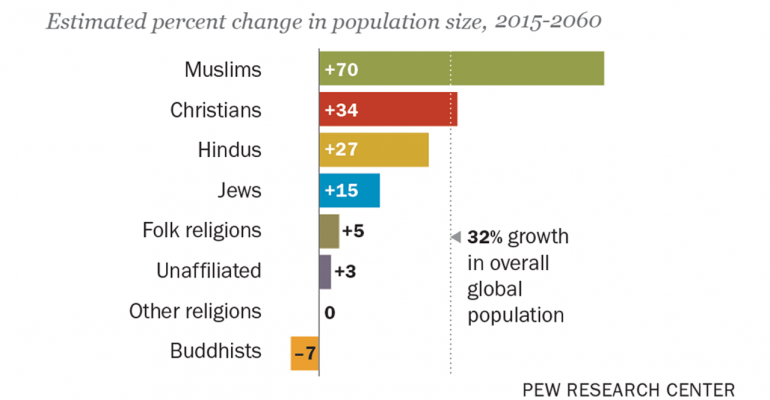Muslims and Islam: Key findings in the U.S. and around the world
May 23, 2017 2023-08-13 12:35Muslims and Islam: Key findings in the U.S. and around the world

Muslims and Islam: Key findings in the U.S. and around the world
Muslims are the fastest-growing religious group in the world. The growth and regional migration of Muslims, combined with the ongoing impact of the Islamic State (also known as ISIS or ISIL) and other extremist groups that commit acts of violence in the name of Islam, have brought Muslims and the Islamic faith to the forefront of the political debate in many countries. Yet many facts about Muslims are not well known in some of these places, and most Americans – who live in a country with a relatively small Muslim population – say they know little or nothing about Islam.
Here are answers to some key questions about Muslims, compiled from several Pew Research Center reports published in recent years:
- How many Muslims are there? Where do they live?
There were 1.8 billion Muslims in the world as of 2015 – roughly 24% of the global population – according to a Pew Research Center estimate. But while Islam is currently the world’s second-largest religion (after Christianity), it is the fastest-growing major religion. Indeed, if current demographic trends continue, the number of Muslims is expected to exceed the number of Christians by the end of this century. Although many countries in the Middle East-North Africa region, where the religion originated in the seventh century, are heavily Muslim, the region is home to only about 20% of the world’s Muslims. A majority of the Muslims globally (62%) live in the Asia-Pacific region, including large populations in Indonesia, India, Pakistan, Bangladesh, Iran and Turkey.
Indonesia is currently the country with the world’s largest Muslim population, but Pew Research Center projects that India will have that distinction by the year 2050 (while remaining a majority-Hindu country), with more than 300 million Muslims.
The Muslim population in Europe also is growing; we project 10% of all Europeans will be Muslims by 2050.
- Why is the global Muslim population growing?
There are two major factors behind the rapid projected growth of Islam, and both involve simple demographics. For one, Muslims have more children than members of other religious groups. Around the world, each Muslim woman has an average of 2.9 children, compared with 2.2 for all other groups combined.
Muslims are also the youngest (median age of 24 years old in 2015) of all major religious groups, seven years younger than the median age of non-Muslims. As a result, a larger share of Muslims already are, or will soon be, at the point in their lives when they begin having children. This, combined with high fertility rates, will fuel Muslim population growth.
While it does not change the global population, migration is helping to increase the Muslim population in some regions, including North America and Europe.
- How do Americans view Muslims and Islam?
A Pew Research Center survey conducted in 2017 asked Americans to rate members of nine religious groups on a “feeling thermometer” from 0 to 100, where 0 reflects the coldest, most negative possible rating and 100 the warmest, most positive rating. Overall, Americans gave Muslims an average rating of 48 degrees, similar to atheists (50).
Americans view more warmly the seven other religious groups mentioned in the survey (Jews, Catholics, mainline Protestants, evangelical Christians, Buddhists, Hindus and Mormons). But views toward Muslims (as well as several of the other groups) are now warmer than they were a few years ago; in 2014, U.S. adults gave Muslims an average rating of 40 degrees in a similar survey.
Republicans and those who lean toward the Republican Party gave Muslims an average rating of 39, considerably cooler than Democrats’ rating toward Muslims (56).
Other questions addressed are:
- How many Muslims are there in the United States?
- How do Europeans view Muslims?
- What characteristics do people in the Muslim world and people in the West associate with each other?
- What do Muslims around the world believe?
- How do Muslims feel about groups like ISIS?
- What do American Muslims believe?
- What is the difference between Shiite Muslims and Sunni Muslims?
Read more at Pew Research Center’s Website.








